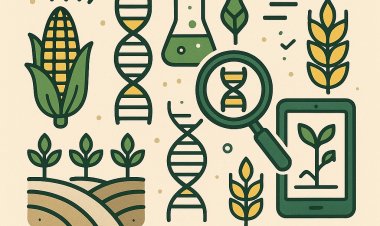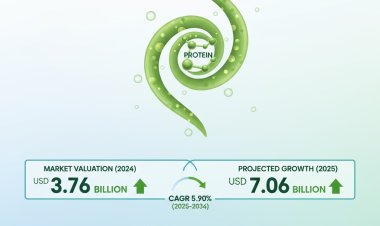Global Eubiotics Market Size to Reach $9.63 Billion at a CAGR of 8.9% by 2030
Vantage Market Research expects the Eubiotics Market to reach USD 9.63 Billion by 2030, exhibiting a growth rate (CAGR) of 8.9% during 2023-2030.

Market Overview
The Global Eubiotics Market size reached USD 4.87 Billion in 2022. Vantage Market Research expects the market to reach USD 9.63 Billion by 2030, exhibiting a growth rate (CAGR) of 8.9% during 2023-2030.
Eubiotics is a term used to describe a new approach to animal health and farming practices. It is based on the use of natural products and techniques to maintain and promote the health of livestock, poultry, and other animals. The term Eubiotics is derived from the Greek word "eu," meaning "good," and "bios," meaning "life." The aim of Eubiotics is to maintain a natural balance in the gut microbiome of animals, which in turn promotes better digestion, improves immunity, and reduces the need for antibiotics. Eubiotics involve the use of probiotics, prebiotics, essential oils, organic acids, and other natural products that promote optimal gut health and enhance food safety. It represents a sustainable and holistic approach to animal health and farming that emphasizes the well-being of animals, the environment, and human health.
Request Sample Report of Eubiotics Market @ https://www.vantagemarketresearch.com/eubiotics-market-2162/request-sample
Top Companies in Global Eubiotics Market
- DSM (Netherlands)
- Novus International Inc. (U.S.)
- UAS Laboratories (U.S.)
- Lallemand Inc. (Canada)
- Calpis Co. Ltd. (Japan)
- Advanced BioNutrition Corp. (U.S.)
- BENEO (Germany)
- BEHN MEYER (Germany)
- Lesaffre Group (France)
- Kemin Industries Inc. (U.S.)
- DuPont de Nemours Inc. (U.S.)
- Novozymes (Denmark)
- Associated British Foods PLC (UK)
Working of Eubiotics
It works by promoting a healthy and balanced microbiome, the collection of microorganisms that reside within an animal's gastrointestinal tract. Eubiotics achieve this balance by selectively targeting specific microorganisms and helping beneficial bacteria flourish. Probiotics, prebiotics, and organic acids are all essential components of the eubiotic approach. Probiotics are live microorganisms that benefit the host's health, such as Lactobacillus acidophilus and Bacillus spp. Prebiotics, on the other hand, are non-digestible ingredients that stimulate the growth and activity of beneficial bacteria. Organic acids, such as citric and butyric acid, also play a vital role in Eubiotics by actively inhibiting the growth of harmful pathogens. By implementing eubiotic strategies, animals have lower levels of disease, improved immune function, and better overall performance. In addition, Eubiotics can help reduce the use of antibiotics and other chemotherapeutic agents in animals, thereby reducing the risk of antibiotic resistance and preserving the quality of animal-derived food products.
When to use Eubiotics?
Eubiotics can be used in many instances, such as after antibiotic treatments which can often lead to an imbalance of gut bacteria. Additionally, during stressful periods, the gut environment can become imbalanced, which can negatively impact digestion and overall health. Eubiotics can be used during these times to help promote a healthy balance. Finally, Eubiotics can be used to support gut health in individuals who may not consume enough dietary fiber or have an imbalanced diet. Overall, Eubiotics are a valuable supplement for maintaining a healthy balance of gut bacteria.
Buy Now Our Eubiotics Industry Report @ https://www.vantagemarketresearch.com/buy-now/eubiotics-market-2162/0
Ongoing and Future Trends of the Eubiotics Industry
One of the ongoing trends in Eubiotics is the use of probiotics, prebiotics, and synbiotics. Probiotics are live microorganisms that help promote a healthy gut microbiome and immunity. Prebiotics, on the other hand, are fibers that feed and stimulate the growth of beneficial bacteria. Synbiotics are a combination of probiotics and prebiotics that provide greater health benefits to the host. Another trend in Eubiotics is the development of novel microbial strains through genetic engineering. This technology allows for the creation of specialized strains that can target specific pathogens or improve overall health by producing beneficial metabolites. Research has also shown that the use of Eubiotics in animal feed can improve production efficiency and reduce the need for antibiotics, which has led to stricter regulations on the use of antibiotics in livestock.
What’s in the Future for Eubiotics?
Looking into the future, Eubiotics will continue to be a crucial component in food and agriculture. The use of Eubiotics in crop production is expected to increase as it can improve plant growth, nutrient uptake, and disease resistance. Additionally, the development of microbial-based therapies for human diseases and applications in wastewater treatment are promising areas for growth in Eubiotics. As more research is conducted, the potential for Eubiotics to provide sustainable solutions for food and medicine is vast.
Eubiotics represent a promising area of research and innovation in the field of animal health and nutrition. Through the use of probiotics, prebiotics, and organic acids, Eubiotics offer a natural and sustainable approach to improving animal gut health, boosting immune function, and enhancing overall performance. Eubiotics have shown great potential in reducing the use of antibiotics in animal production, addressing concerns around antibiotic resistance, and promoting animal welfare. However, further research is needed to fully understand the mechanisms and benefits of Eubiotics and to ensure their safe and effective use in various animal species and production systems. Overall, Eubiotics offer a viable solution for addressing the complex challenges facing animal health and nutrition in a changing world.
Read Our Latest Press Release: Business Travel Market - In-depth Analysis
Contact us
Eric Kunz
6218 Georgia Avenue NW Ste 1 - 564
Washington DC 20011-5125
United States Tel: +1 202 380 9727
Email: [email protected]
Website: Vantage Market Research


















